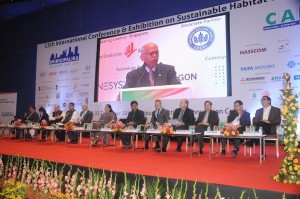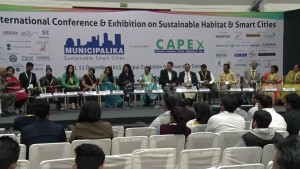Jaipur, Dec 11, 2015: With the need to accommodate rapid urbanisation of the age, development of smart cities has emerged as the need of the hour. Cities, contributing to nearly 70% of the country’s GDP, are now in want of adequate and sustainable housing, sanitation and infrastructure to ensure an improved quality of life. Drawing on the global immediacy, the Union Government of India has embarked on a mission for developing 100 smart cities in the country. For this, the respective State Governments have geared up to help the Centre realise its goal. Rajasthan has set an example through earnest involvement in the Centre’s initiatives such as Swachh Bharat Mission, Smart Cities, AMRUT (Atal Mission of Rejuvenation and Urban Transformation), Housing for All and HRIDAY for better governance and quality life for the residents. This was stated by Rajasthan Chief Minister Vasundhara Raje when she inaugurated Municipalika 2015, the 13th International Conference and Exhibition on Sustainable Habitat and Smart Cities, in Jaipur, which took place from December 9-11, 2015. Pink city Jaipur hosted Municipalika for the first time at Jaipur Exhibition and Convention Centre, Sitapura, with Jaipur Municipal Corporation as the Host City for the event. The three day event welcomed over 1,600 delegates from all over India and abroad, that had as its participants a large number of urban and housing sector officials, representatives of 176 local bodies, 40 Mayors and Chairpersons and Municipal Commissioners, Secretaries from 24 states and 300 cities, over 500 Municipal Counsellors, international delegates from 7 countries, private industry and professionals. Along with national and state level government participation, the programme witnessed active support from UN-Habitat, UNDP as well as many other national and international urban stakeholder institutions. In the Inaugural address, Rajasthan CM Vasundhara Raje made a fervent appeal to the people at large to extend their active support to the Government in building clean, liveable, sustainable and smart cities. She urged the citizens and mayors and representatives of the local municipal bodies to motivate their fellow men for working hand in hand to materialise the vision for smart living. She also said that the State Government has taken a decision to significantly bring down the carbon footprint cutting across such as tree plantation, water conservation and recycling. In this context, all 33 districts of the state will be competing in reducing the carbon footprints. With regard to mass migration of the rural population to the cities, Minister of Urban Development and Housing, Government of Rajasthan, Rajpal Singh Shekhawat said that the ‘Mukhyamantri Jan Awaas Yojana’ has been launched. He announced that the state would get an investment of Rs 40,000 crore in the urban sector alone. While, an investment of one lakh crore rupees in the sector is expected in the next five years. Forewarning a growth of 40% in the next 15 years in Indian urban population, Canada’s High Commission to India, Nadir Patel said that the country will urgently need to take measures for transformation. Canada, a leading country in the world for creating urban facilities with a strong ecosystem is already doing business in the country and helping India in the transformation. Country Director, Indian Resident Mission, Asian Development Bank, M Teresa Kho said that the Asian Development Bank (ADB) is collaborating to build 100 smart cities in the country. She lauded the efforts of Rajasthan in creating urban infrastructure which would become a role model for other states. She said Rajasthan has set an example for the best practices and best implementation, particularly in the area of drinking water supply. Singapore has already started providing its expertise in building smart cities in India, said Executive Director of Building and Construction Authority (BCA), Singapore, Choo Whatt Bin. Smart cities will be the stepping stone towards smart nations, he added. Smart cities would however require legislation, planning and designing, financial plan, management and long term planning aimed for 20 years, a major concern, attention to which was drawn by the Representative in India for UN Habitat, Alain Grimard. The demographic challenge looming large in the country was highlighted by the Resident Coordinator, United Nations Development Programme (UNDP) – Yuri Afanasiev, who said that by the year 2030, it would have 200 million rural persons migrating to the urban areas. He said India will have to really work hard to achieve all the 17 parameters of smart cities. The Economic Adviser to the Ministry of Urban Development, Government of India, K V Pratap praised the role of the state in building smart cities. He further added that for the cities, to be clean and sustainable, smart solutions were required and core infrastructure needs to be bolstered. All the dignitaries pointed at the context and importance Municipalika would play in the next three days. The inaugural session was coordinated by V Suresh, Advisor, Good Governance India Foundation and former CMD, HUDCO. Principal Secretary, Local Self Government (LSG), Dr Manjit Singh informed that Municipalika 2015 was organised by the Good Governance India Foundation in close collaboration with the LSG Department, Government of Rajasthan. The welcome address was given by Sanjiv Agarwal, the Founder of Good Governance India Foundation (organiser of Municipalika) and Editor-Publisher of Urban News Digest, and the Vote of Thanks was proposed by the Mayor of Jaipur, Nirmal Kumar Nahata. The inauguration concluded with the release of the latest edition of the publication Urban News Digest along with other green urbanisation publications, by the Chief Minister. Besides a robust Exhibition segment, Municipalika conducted 12 thematic sessions, 4 technical sessions, a Vision Address and an Open House Citizen’s interface. Municipalika 2015 saw a milieu of over 200 speakers deliberating on various specialised urban topics in India’s biggest knowledge sharing platform. Canada, which had been a Partner Country of Municipalika last year, signed up as the Partner Country for this chapter of Municipalika as well, bringing over 40 companies in its delegation. Key areas of focus for Canadian companies included: water and waste water, urban planning, architecture and design, and transportation infrastructure including, intelligent transport systems. U.S. Green Building Council (USGBC) joined as the Associate Partner this year. The Local Self Government (LSG) Department of Government of Rajasthan invited urban, municipal and housing departments of states and UTs across the country; as well as foreign missions and trade representatives of countries active in the smart cities sector and allied areas like water, waste, energy etc; along with leading global technology providers from the private sector. Through the Directorate of Local Bodies (DLB), it ensured maximum participation from all its ULBs, from the nagar nigams, nagar parishads and nagar palikas. Jaipur Municipal Corporation, on the other hand, lived up to its role through significant involvement in ensuring good participation by sending out communications to leading Municipal Corporations across the country, inviting their participation in the Conference and Exhibition.
The event observed significant participation from World Toilet Organisation, World Water Council, Global Observatory linking Research to Action (GORA), World Council on City Data (WCCD), UDP International (Hong Kong), Passive House Institute (Germany), C40 Cities, ICLEI – Local Governments for Sustainability South Asia and many more international organisations. Among important national organisations supporting Municipalika 2015 were : Smart Cities Council of India, National Institute of Urban Affairs, Central Ground Water Board, National Water Mission, Central Pollution Control Board, Gujarat Pollution Control Board, Centre for Green Mobility, National Real Estate Development Council (NAREDCO), Rajasthan State Real Estate Development Council (RAJ REDCO), HUDCO, Rajasthan Avas Vikas And Infrastructure Limited (RAVIL), National Remote Sensing Centre of ISRO, Bharat Sanchar Nigam Limited (BSNL), EMBARQ India, Indian Renewable Energy Development Agency (IREDA), Bureau of Energy Efficiency (BEE), Sulabh International, Indian Heritage Cities Network (IHCN), Central Public Health and Environmental Engineering Organisation (CPHEEO), Centre for Environment and Development Studies, Centre for Study of Regional Development (JNU), Institute of Urban Transport, CEPT University and many more. “I strongly believe that smart cities are possible only with smart leadership for urban governance and smart citizens for genuine participation. I do hope…this conference will richly benefit from the conference deliberations on all facets and also benefit from the exhibition segment. I offer my best wishes and look forward to receive the major recommendations emerging out of Municipalika. The support of the Government of India would be available to all cities in the urban transformation and creating safe, healthy, green and smart cities”, said M Venkaiah Naidu, Minister of Urban Development, Housing and Urban Poverty Alleviation, Government of India in a special message, while congratulating the endeavour supported by Government of India and Government of Rajasthan. A city is successful only when it exhibits the ability to constantly adapt to new economic, social and technological contexts. It is not only about embedding the latest digital technologies but bringing in together smart human capital, institutions and buildings. This issue was discussed by Koh Lin Jin, Group Director of Singapore’s International Development, in his Vision Address on Future Cities on the first day. Koh Lin Ji interestingly prioritised the preservation of the heritage value of cities in the process of smart city development. “The heritage zone is a reflection of an era and it speaks not only of the architecture and culture but much more and each city has its own sanctity which should be preserved. Smart cities never mean destruction of the old order, instead use of the available facilities that could be upgraded. But in case of heritage zone all the care should be taken to ensure that the heritage character of the city is not lost. This would be a great price that we would be paying of the old order are changed like this.” warned Lin. As regards Singapore, Lin was pleased to inform that after its upgradation to a smart city, the island country will now be turning itself into a smart island nation. Special care was being taken to ensure that about nine lakh of its senior citizens get the best out of the smart nation, promising a better and more fulfilling life. He explained, Singapore is a ‘city in a garden’. The average dwelling per km of land in Singapore has 8,000 people, yet the Singapore government is striving to provide six square metre of green to each citizen. Singapore is growing vertically because of paucity of land, yet all the high rise buildings have green spaces to ensure that the citizens do not live in a mere concrete jungle. To qualify as a smart city, building a healthy environment is imperative, the primary component for which is integrated water and solid waste management. Solid waste management, as a crucial genre for action was stressed upon while highlighting the new draft Solid Waste Management Rules to be issued by the Union Urban Development Ministry. The new rules and Swachh Bharat Mission aim at citizens’ active participation, segregation of recyclables, door to door collection and transportation of all segregated waste from source of generation, processing all component of waste, non-recyclable combustible waste on a PPP mode and move towards the concept of zero waste ensuring minimum waste going to landfills. The new rules increase its applicability to all municipalities, notified areas, and all urbanised Panchayats, declared as census towns in 2011 census. The new rules will be applicable to the railways, airports, sea ports and defence establishments. It was discussed in the conference that the new draft rules, green technologies such as biomethanation and composting are mandated to process bio degradable matter whereas waste to energy technologies from non-recyclable high caloric value wastes. All recyclables are to be retrieved from source of waste generation or at material recovery facilities to conserve natural resources. Some construction and demolishing waste is also mandated to be converted into bricks, paver blocks, building material. The new rules will moreover demand responsible citizen engagement for waste management. The pay users are to be provided fees for the sustainability of services and if the citizens do not comply, municipalities would impose fines by making suitable provisions in the municipal bylaws. Soon the Ministry of Environment and Forest would prescribe heavy penalties under Environment Protection Act 1986. Again, the smart city initiative would be incomplete without community participation, entailing awareness creation, capacity building, information, education and communication (IEC) and NGO aid, a pressing concern that was addressed on the second day of the event. Speakers stressed for an effective disposable system involving community participation. They focused on the challenge of making water free of fluoride and arsenic and providing water and sanitation to all, one that the Union government has bravely borne on its shoulders. They also delineated the measures adopted for building facilities for toilets and how the Swachh Bharat Kosh has been set up to attract Corporate Social Responsibility (CSR) funds from the corporate sector and contribution from individuals and philanthropists to achieve the objectives of Clean India by 2019. The three-day cerebration reached its peak when Mayors, City Managers, Social Activists, NGO and subject experts of participative cities came together to share their first-hand experience on various civic issues in an Open House Citizen Interface presided over by social activist Shazia Ilmi. Leading from the front, Mamta Gupta, Mayor of Rewa in Madhya Pradesh, has collected garbage from ‘door to door’, inducing citizen involvement by charging them one rupee per day. She has also undertaken the task of making the city ‘polythene free’. Pantam Rajini Shesha Sai, Mayor of Rajahmundri in Andhra Pradesh spoke at length about the large women group of 50,000 that were involved in creating awareness about sanitation. She said the municipal corporation used students to create awareness about sanitation successfully. Lauded for his efforts was Shakti Singh Choudhary, Mayor of Gangtok, for imposing user’s charges on civic facility utilisation despite severe political opposition. Innovative garbage collection and organic city has made Gangtok the cleanest hill station in the country, claimed Choudhary. He said no to the use of fertilisers or synthetic manures in the state. With zero level open defecation, those found violating the rules were subsequently fined. B L Bairappa, Mayor of Mysore, said that effective monitoring and garbage disposal with strong action has made Mysore the cleanest city of the country. He said the municipal administration of Mysore uses wireless to keep in touch with field employees who are monitored. While activists and civil society members pointed out the benefits of efficient connection with the stakeholders and policy makers, Mayor of Jaipur, Nirmal Nahata, enlightened on the issue of revenue generation from the citizens. The experience of involving people, especially the women’s group in sanitation drive was narrated by Mayor of Amaravati, Charanjit Kaur Nanda. Dr Sujata S Govada, Managing Director of Hong Kong based UDP International talked about strategic master planning, sustainable development and planning studies. Apart from this, technical sessions were conducted simultaneously in the co-located show CAPEx over the three days on the latest array of building and construction technologies, needed for the massive building constructional needs for speedy construction practices, including green building products. The technologies and smart solutions projected at the conference sessions received immediate corroboration at the exhibition at the Centre, incorporating technologies, services, products, equipments, machineries and managerial systems within a common space of over 8,500 sq m. Over 140 Exhibitors displayed, including live demonstrations for new technologies as over 5,000 visitors benefitted from the display. The event also honoured the winners of Urban Innovation Challenge (UIC) 2015 for their innovative solutions to systemic challenges in the urban areas, awarding under-graduate, post-graduate students and young professionals from different disciplines. The theme of the competition this year was Smart Cities and Green Buildings with designs and ideas of candidates from architectural schools, engineering colleges and urban planning institutions from all over India. Municipalika 2015 culminated with the valedictory address of Urban Development and Housing Minister of Rajasthan, Rajpal Singh Shekhawat. According to the Minister, cities were now gauged by the index of happiness and how a city makes lives convenient for the dwellers. The idea of smart cities, for him, was a great integration of culture, heritage and technology and the legislation for governance would undergo a lot of changes in the next quarter of a century. While submitting an observation and recommendation report to the audience in the Valedictory Session, V Suresh, the Convenor of Municipalika and Advisor of Good Governance India Foundation noted that in addition to the policy support from the Government, the Swachh Bharat Mission can be successful only with complete participative involvement of the citizens. There is need for making toilets for all, linked with water for all, as an integrated approach. He said the thrust should be on door to door collection of garbage. Smart Cities and AMRUT Cities should be developed with integrated and holistic approach to bring in smart elements and service delivery for the city development. Efficient water management system including waste water recycling has to be introduced compulsorily. Most importantly, ICT should become a major enabler for back up infrastructure and not necessarily a driver. Sanjiv Agarwal, Founder of Good Governance India Foundation, concluded the programme with a vote of thanks and with the announcement of the next Municipalika in November 2016 in Navi Mumbai. This was followed by an award ceremony congratulating and awarding the top exhibitors for best displays and solutions.



